In 1994 I was 16.
I was in the midst of my self-absorbed teenage years – a time in my life when nothing seemed as important as what kind of clothes I was wearing, and my daily mood was dictated by whether my current crush had said “Hi” to me in the hallway between classes that day. I was the center of my attention.
I distinctly remember the moment that God took my focus off of me.
Throughout my childhood, my mom subscribed to Time Magazine. There were always a few copies lying somewhere near the couch and occasionally I would pick one up and casually leaf through it.
One day, in May, I picked up a magazine with this cover …
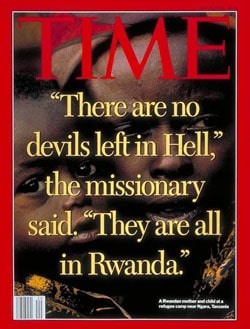
I proceeded to read the article, both fascinated and horrified by the words I was reading. As I looked at the gruesome pictures, God did a major work on my heart.
My focus suddenly shifted from myself to those living through the nightmare happening in Rwanda. I was at once both distraught about what was happening in Rwanda and heartbroken for my own self-centered worldview. My world – my concerns, my interests, my dreams, my prayers – suddenly seemed so trivial in comparison.
That was the first time I remember thinking about people outside of the world I knew. I didn’t realize that God was using that moment to plant seeds in my heart – seeds that would eventually bear fruit in my choice of career, where I give my money, and how I live my life.
Fifteen years later I still haven’t forgotten that day or those images.
Elie Weisel, a Jewish Holocaust survivor, said: “The opposite of love is not hate, it’s indifference.”
Even though the genocide happened 15 years ago, we must never allow ourselves to fall into indifference. The images can still have a profound impact on many lives.
Pictures tell stories in ways that words never can. So here is the story, 15 years later…
How did the genocide affect your life? Did it alter your view of God? Did it change your perspective on injustice? Have you explained to your children what happened?
Photos and slideshow by Chuck Bigger, one of God’s biggest blessings to Compassion.
If you have difficulty viewing the slideshow in this post, you can also check it out in Flickr.Upload your photos to our Flickr group. Show us how you see poverty.

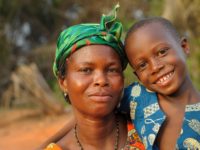
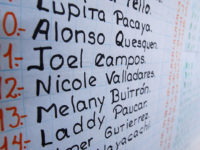
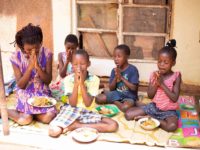
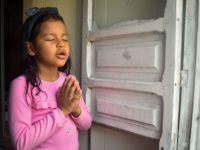


12 Comments |Add a comment
Amanda, thank you so much for sharing. I’m speechless.
It’s amazing how God works. He puts you in places that you need to be so he can open ones’ eyes. Thanks for your story.
Amanda, sounds like your time in Rwanda was life changing! Thanks for sharing your experience.
I didn’t know the genocide even took place until 2003 when I was in college. Ever since I watched a video about what happened, I have been appalled that the world did nothing.
I have since been to Rwanda for a Compassion tour and have now become amazed at how the country has changed.
On Snapfish, you can see my pictures:
http://www2.snapfish.com/thumbnailshare/AlbumID=255561289/a=161358030_161358030/otsc=SHR/otsi=SALBlink/COBRAND_NAME=snapfish
It’s a bit lengthy, but here’s what I wrote about my trip:
Dear friends and family,
As some of you know, I recently traveled to Rwanda on a Compassion International tour. I met two of our sponsored children, Gisele and Violette, and my mom’s sponsored child, Anastasie. I also got to experience Compassion’s work in the country and play with hundreds of kids!
Ever since I learned about the Rwandan genocide, I have desired to know as much as I can about what happened. After reading numerous books, I became very frustrated that I couldn’t find anything positive. “What’s happened since the genocide,” I found myself asking. While preparing to leave for my trip, I asked God to show me positive outcomes; something I could share with people after coming back home.
On our first day, we went to a church service that lasted for a couple hours; not much different from services here, except it was spoken in Kinyarwanda (the local language) and French. Even though I could not understand the language, I sensed God’s presence and worshipped in spirit right alongside our brothers and sisters.
During the sermon, we had a translator sitting next to us, so I was able to understand some of what the pastor said. He spoke on Ps
.alm 92, which became the scripture that God used to reveal the works of His hands in Rwanda. I would like to take you on a journey using this passage. Please read this Psalm from your own Bible as you go along.
Psalm 92:1-3
The people of Rwanda have much to be thankful for. Throughout the week, we visited numerous churches (which were also Compassion student centers). Each place we visited and each person we interacted with, I could see that they were thankful to God for providing for their needs and for healing their country.
It was surprising to see the people with so much thankfulness and joy. I expected to be sad the entire trip as I would be in the very same place where horrible murders happened. But remember, I asked God to show me positive things; He did that to a much greater degree than I ever thought possible!
Psalm 92:4-5
The works of God’s hands in Rwanda are these: Forgiveness, healing, reconciliation, hope and joy. People all across this amazing country have forgiven those that killed their family and friends.
I would like you to stop and think about this for a minute. Put yourself in their position (as hard as it might be). Your ethnic group is being attacked by another; you are afraid for your life and the lives of your family members. Your home is not safe, your neighbor’s home is not safe, nowhere is safe. You have to hide to stay alive, but hiding is difficult. You sometimes have to hide in marshes or behind a cactus. How will you eat while you are running away? What happens if one of your children breaks their leg? Or worse, what if your child is hacked to death by a machete? (Please excuse the vulgar images, but this is what happened). Can you even go on at this point? What if your entire family, except you, has been burned to death?
Maybe you make it across the border to safety, but are now in a refugee camp. You search and search for people you may know; you find one or two children that now have no parents, so you take them into your family. You end up living in Uganda for a few years until you feel it is safe to go back home. But are you ready to go back there? Can you face what happened?
You get back to your home, and find out the person who murdered your family is living nearby. You wonder to yourself: “Why isn’t he in jail? He should be locked up for the rest of his life for what he did!” You are often afraid to live next to him; you can’t even look him in the eye.
What are you to do? Do you continue to have bitterness and hatred toward him? “Well, of course!” you might say. “He murdered my family!” But then you are invited to church by your friend. At first, you don’t want to go. “What good is church going to do me? God didn’t save me when I needed Him. Why should I care about a god that didn’t save my family?”
Finally, after much prodding from your friend, you decide to go anyway. God begins to speak to your heart. You start to realize that you are a sinner and need forgiveness from Him. God forgives you and now you are a child of God. As time goes on, you continue to learn more about God’s forgiveness and start to realize that you can’t hold on to your hatred anymore. God calls you to forgive your enemy, no matter what they did to you.
You understand that you need to forgive your neighbor, but you struggle with it day after day. That hatred keeps creeping into your mind. You have nightmares all the time about your family being murdered. But then God keeps reminding you that you were once a sinner, but are now forgiven yourself.
One day, you decide to visit your neighbor. It is very difficult to face him, but you look into his eyes and see the pain in his heart. You tell him you have forgiven him for what he did. Your neighbor accepts it after much quietness and then offers to help you in your fields.
This is what has been happening in Rwanda these past 15 years: People finding God’s forgiveness for their own sin and turning around to forgive those that took part in the genocide. Sounds difficult, right? Impossible? Well, we have a God that does not see impossibilities. “For nothing is impossible with God.” (Luke 1:37)
The people of Rwanda are growing, expanding, and building. Not only are they rebuilding their lives physically, but also emotionally and spiritually. God has taken a once-divided nation and created an example of healing, forgiveness and reconciliation. We could learn a lot from what they’ve been through.
Psalm 92:6-9
Evil did spring up like grass in Rwanda in April 1994. This may be difficult to do, but now I want you to imagine yourself on the side of evil. (If you are offended here, I apologize. I am merely trying to point out the effects of evil.)
On that fateful day, Hutus started massacring the Tutsis. All Hutus were called upon to participate, no matter what. If your wife was a Tutsi, you were commanded to murder her; if you didn’t do it, you were killed alongside everyone else. Everywhere you turned, from the cities to the countryside, people were using machetes, guns and whatever else they had to murder every Tutsi that crossed their path, from babies to grandparents.
So imagine you are a Hutu. You are being told over and over that Tutsis are oppressing you, taking all the good jobs, all the land. You’re constantly hearing on the radio to “cut the tall trees,” which means to kill the Tutsis. You know that if you don’t take part in the killing, you and your family will most likely be killed. So, what do you do? Do you try to run? Do you hide in your home, hoping no one will find you? Do you risk your own life to save someone? Or do you participate in the killing?
Let’s say you do begin to “cut the tall trees.” At first, it’s hard, but after a while, it becomes easy. Why? You don’t see the Tutsis as humans anymore; they are only seen as problems to be absolved of. And of course, who can forget all the “blessings” that come from this: Every day, you’re able to pillage your neighbors’ homes; you don’t have to harvest your fields! Everything is free! Life is good! (I got this impression when reading “Machete Season” by Jean Hatzfeld, which details interviews of killers)
Hard to imagine? Yes, it’s very difficult. But it happened, for 100 days straight. During the worst days of the genocide, more than 20,000 people a day were killed. The current estimated total number of people killed is now around 2 million.
Evil is dangerous; if we allow it to grow, it can spring up like grass. But thankfully, we have a God that brings evildoers to justice.
Many participants in the genocide went to jail for a time, but most people were actually brought to justice with the use of very informal “gacaca courts.” An accused person was brought to a community meeting where witnesses testified to what they saw that person do. Then, the accused person would stand before the group, confess what he (or she) did, then ask for and receive forgiveness.
Amazing, right? Most of you can probably see that the only way the people of Rwanda have forgiven each other is by the power of God. Would you be able to forgive your neighbor without the power of God? Think about how hard it is to even forgive someone for yelling at you!
Psalm 92:10
In my Bible, I am told that “horn” means strength. I saw amazing strength in these people, strength that could only come from God. Let me share one story with you.
One day, a group of us visited the home of a student who has just graduated from high school and is trying to get into college. He, his two siblings and mother, lived through the genocide; however, his father did not. I don’t know the details of how his father died (most people did not say anything about the genocide). His mother did say that it was very hard to go on living after the genocide, but she found strength in God and was able to continue providing for her children (with the help of Compassion, of course). Her son became a great leader in his school and even got involved in witnessing to people about the love of God. He is a very humble, yet strong young man.
Psalm 92:12-13
Yes, the righteous are flourishing. Rwanda is now about 90-95% Christian; God is moving in people’s hearts. They are flourishing so much that at times, I felt as though I was in a developed country, like America.
Let me share a few examples of this. 1) On one of the first days, we drove by a “lumber yard” area that was very impressive. There was so much positive activity – hundreds of people were hauling in lumber and building things such as beautiful bed frames. 2) Rwanda provides health insurance and malaria nets for everyone. 3) Their tourism industry is back to normal. 4) They are now teaching English to all children.
Certainly, there are still much poverty, much need for help, but I would not be surprised to see them become like South Korea. (If you don’t know, South Korea was the beginning location of Compassion International. Orphans from the ravages of war needed help and Compassion was born. Now, South Korea sends missionaries and no longer needs help from Compassion.)
Psalm 92:14-15
These verses are probably the most significant to me because they remind me of children. We visited a Genocide Memorial (www.kigalimemorialcentre.org), which had a large number of gardens symbolizing different aspects of Rwanda. One garden in particular was called the “Fruit Tree Garden,” which symbolizes children, the fruit of the world. We went to the memorial at the end of our trip; I found much hope in this garden, contemplating what I had seen and experienced with the children we met.
Most of the children we played with were not around during the genocide, but they are definitely affected by it. However, what I saw in them was pure innocence, amazing joy, and hope. Children have the power to turn our life upside down, if we let them.
The gift I was able to give these children was a picture. No, I didn’t have a Polaroid camera. Everywhere we went, I would be asked: “Take my picture.” They may have spoken that in English, but most just told me by their gestures. So I would take out my camera, snap a photo and smile as I heard them giggle when they saw their faces on the screen. It didn’t matter if they weren’t smiling, or looking in the right place, or even weren’t entirely in the photo. They were just excited to see themselves on screen. I will never forget those giggles, those smiles, those faces all lit up.
I was constantly surrounded by children who just wanted attention – not so different from children here. Let me tell you a story about Agnes. Agnes is a girl I met, who I also found a sponsor for. When I met her, she was very shy, but probably quite surprised that she was called out of the crowd. I encouraged Agnes to play with the other children and was delighted to see her laughing. Even though we did not share the same language, I was able to show her God’s love. Agnes held my hand for most of our time together. We said our goodbyes and then our group went to the church office. However, while we were there, Agnes found me and immediately held my hand some more! Agnes reminded me of how simple it is to show love to a child.
As I said before, I met our sponsored children and my mom’s sponsored child. I knew it would be interesting to meet three at one time. I really enjoyed watching them play together. They were very willing to share the soccer ball with each other (yet another symbolism of God’s reconciliation and healing).
It’s always a blessing to meet the children we sponsor because you get to be with them! I was excited to realize that Violette and I both have dimples. Gisele surprised me with how much she smiles – the pictures I receive from Compassion don’t show that. Anastasie has the most beautiful eyes I’ve ever seen. Each of them sang a song for me and I turned around and sang a song to them. The best memories are the ones that come from my senses. I will always see their smiles, hear their laughter, and remember running up to hug them (touch).
My time in Rwanda came to a close too quickly – only one week. But God had taught me a lot about His work there.
In addition to what I’ve shared, I also learned once again about the integrity of Compassion International; I have now been to four countries with Compassion. At every church project (student center), I have been amazed at how consistent they are with their programs. All churches have the same heart towards children; all of them teach the gospel; all make sure children are healthy; all provide safe havens to play in; and all make sure children are attending school. And each child has only one sponsor. If you’ve ever thought about sponsoring a child, I pray you will consider Compassion.
As I close this letter, let me leave you with something I heard while I was there: “Give to the Lord’s work what you have to give.” What do you have to give? For me in Rwanda, it was love through pictures.
For the children, Amanda Cacciotti
Patty-Leigh,
Thanks for sharing your experience. I’m inspired by your journey.
I agree – it’s encouraging to see all the good that God has brought out of such a horrible time.
Becky
i was 17, a senior in high school, in neighboring kenya. we were on holidays so a number of my friends had to be evacuated from rwanda. i had just visited rwanda the summer before (1993) so it had a deep impact on me.
in fact, i would say that this event most influenced my career/ministry. while in college, i heard gary haugen speak so profoundly about his experience in rwanda and because of this and my own personal experience with rwanda i became a relief worker.
i have since worked in sudan, afghanistan, sri lanka, tajikistan, kurdistan and rural, poverty-stricken USA (which surprised even me).
of course i wish such a terrible, gruesome thing as genocide had never happened. but isn’t it amazing how God brings good things out of the worst things you can imagine???
i am blessed remembering this truth.
I was 13 in 1994. I don’t remember this. Obviously, I was too concerned with other things…as were my parents.
And that’s why my daughters KNOW what’s going on the world. They pray for our sponsored children…they understand (well, at least my 6 year old does…) the hardships because we talk about it all. THIS…our Sponsored Children are what’s important!
Beautiful, powerful photos.
I was a sophomore in college in 1994…and although I was becoming globally aware (I had just become a Compassion sponsor), I was still pretty focused on myself.
I really wasn’t aware of all the details until I met Pascal Nzabonimpa at an Advocate’s Conference. He told us his own story and I was shocked to hear what had happened in Rwanda. It was very powerful to me, and the most moving part of his testimony was his overflowing love and gratitude that he expressed towards all the sponsors in the room. It really showed me the difference a sponsor makes in the child’s life. Thank you for the the excellent post and truly beautiful photos! Pascal’s story is at: https://www.compassion.com/child-advocacy/find-your-voice/photo-essays/pascal-slideshow.htm?Page=1
We seem to have the idea that if it’s not affecting us, then it’s not important. If the same thing happened in Canada, I would want the world to care – I would want the world to try and end it. How is Rwanda any different? It’s all about me, me, me these days. We sat by and watched almost a millioin of our fellow humans die because of their ethnic background. (Interesting note, I listened to a lecture about post-genocide justice recently, and the lecturer said that there wasn’t any physical differences between the Hutu and Tutsis – the only “differences” were those created by the countries that colonized Rwanda)
But through all of this, there is hope. God can mend Rwanda – He can heal the families that lost loved ones, He can rebuild the country. He can give hope back to those who lost hope in 1994.
I saw the article while working at the library. A small child was being held by his mother along a bed of sorrow. I chose to sponsor a child in Rwanda who was the age of that little boy. He is now almost 16. Was he that child? No, but he could have been. Thank you Compassion for all the attention you have been giving to Rwanda this week.
I was 11 May 10, 1994. And I am not sure if I even knew at the time what was going on at all. I might have heard mention of it a few times, but I did not even watch the news. Just X-men on Saturday morning cartoons. I moved that year and know I was more focused on being sad to leave my friends than anything else. It’s amazing how easily I cannot focus on almost anything other than what is happening in my life.